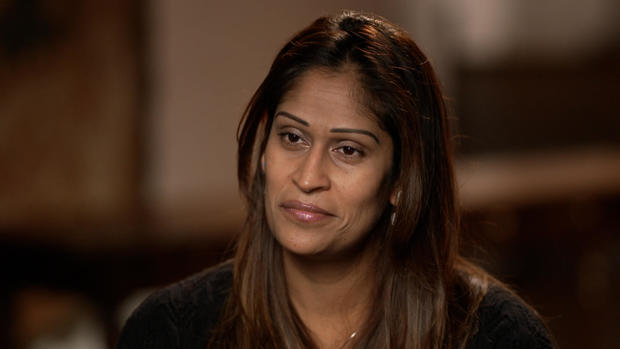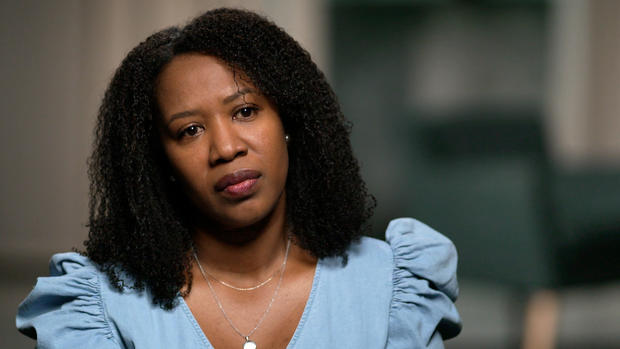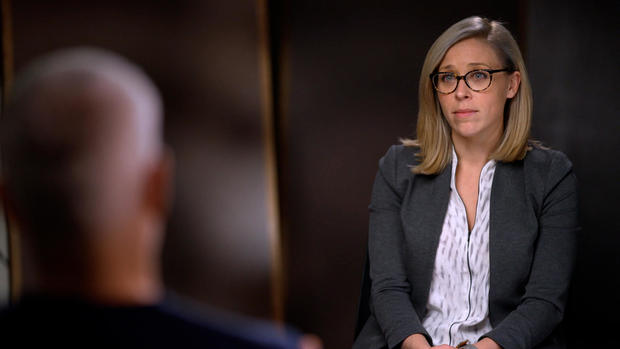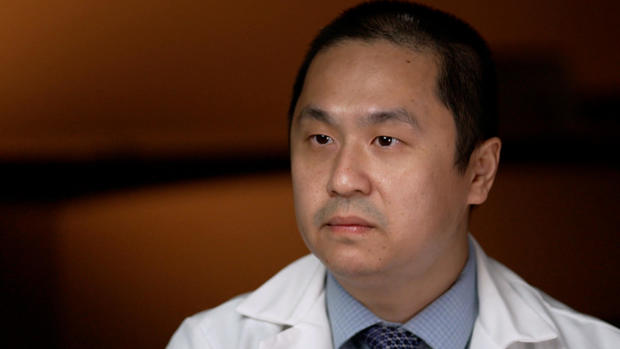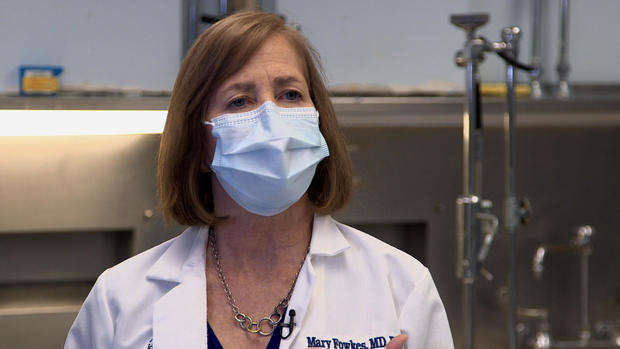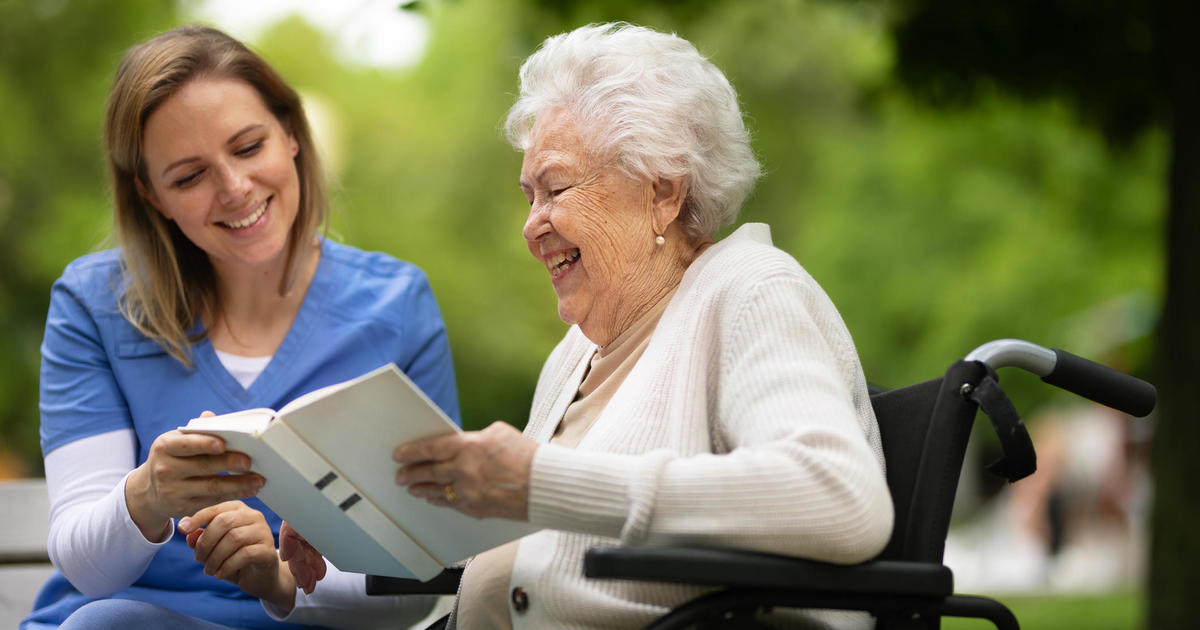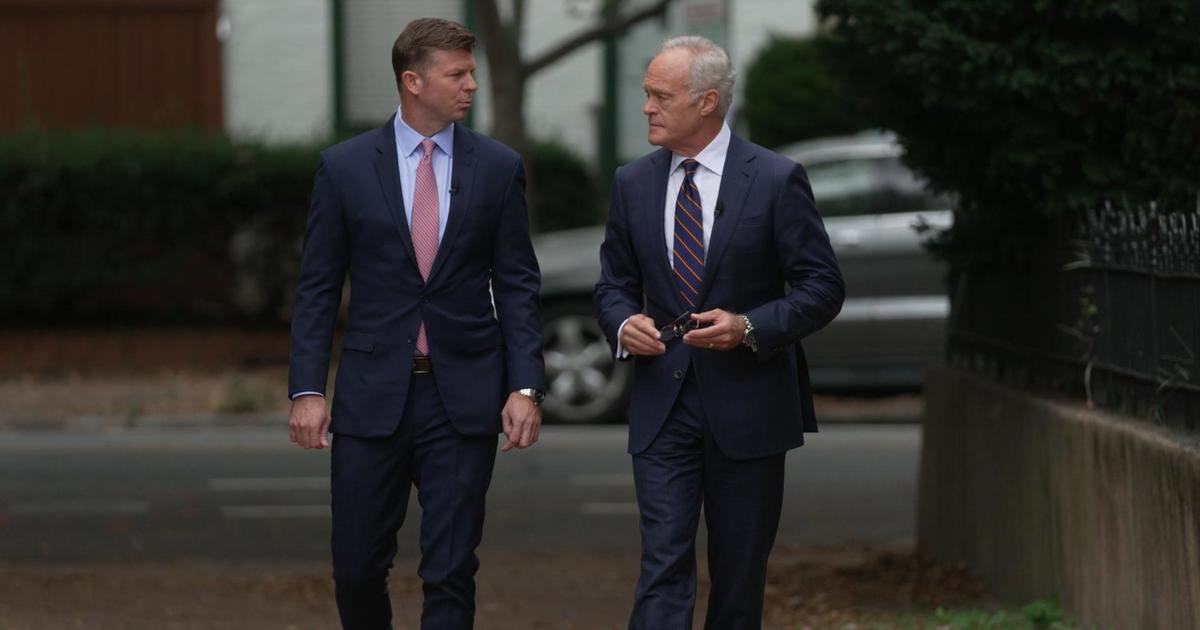Puzzling, often debilitating after-effects plaguing COVID-19 "long-haulers"
COVID-19 was initially thought to be a disease that was serious for the eldery and people with preexisting conditions. A potentially tough, but temporary respiratory illness for everyone else. But now, eight months into the pandemic, younger patients who have had relatively mild cases of COVID, are showing up in doctors offices and emergency rooms with mysterious and debilitating symptoms. It's not unusual for viruses to cause aftereffects, but as you'll hear tonight, doctors tell us they've never seen anything like this. While researchers around the world are scrambling to figure out what's happening, Mount Sinai Hospital here in New York opened one of the first centers to study and treat people with what they're calling "Post-acute COVID Syndrome." The patients we met have a less clinical term - they call themselves "long-haulers."
Sadie Nagamootoo: it's like a, a like a viral tornado (SIGH) that goes in you and kind of just messes you up and then-- like, it kind of leaves. But leaves something behind.
Anderson Cooper: It leaves the rubble that a tornado leaves behind--
Sadie Nagamootoo: The rubble, yeah. It leaves the damage behind.
Sadie Nagamootoo was 44 years old and a personal trainer in New York when she got COVID in March. She was able to recover at home and when she tested negative in May, she thought her life would return to normal. It hasn't.
Sadie Nagamootoo: There are days where I do nothing and just can't get outta bed. The migraines. They are like ten times worse than a flu headache, pains, like muscular issues. And there are some times where my hands feel like they have pins and needles and I have to stop using them because I can't feel anything.
Anderson Cooper: Some people who are going through this call themselves long-haulers. Do you think it's gonna be a long haul?
Sadie Nagamootoo: It has been a long haul.
Eight months after getting infected, she says she can't workout, or work in the gym - just walking up stairs sends her heart rate soaring.
Sadie Nagamootoo: The grocery store's, like, the dread for me.
Anderson Cooper: What's hard about the grocery store?
Sadie Nagamootoo: I cannot lift bags and walk.
Anderson Cooper: You're a full time trainer, and you can't lift grocery bags.
Sadie Nagamootoo: Correct.
Sadie has seen half a dozen doctors in the past six months. Her bedside table looks like a medicine cabinet.
She's been diagnosed with post-viral fatigue, inflammation in the lungs, and tachycardia - a rapid heart rate - but no one can tell her exactly why this is happening.
Anderson Cooper: It's gotta take such a toll mentally to still be dealing with this.
Sadie Nagamootoo: It's depressing is really what it is. Nobody can really understand or relate to you except somebody else who's had the same problem.
Anderson Cooper: What's been worse for you, the initial infection or the aftermath of COVID?
Nitza Rochez: The aftermath, without a doubt.
Nitza Rochez also got COVID in March. And by May the infection was gone. But 191 days later, she's still struggling.
Nitza Rochez: I was sick with COVID. But this post-COVID experience has been beyond the worst experience of my life.
Nitza loved to run. Three years ago she completed the New York City Marathon and the following year - Berlin. At 43, she was training for another race when she got infected.
Now, she tells us she has trouble walking more than a few blocks down the street.
Nitza says she's had so many strange and unrelenting symptoms, she started documenting them on her phone. She got tremors in her hands and had problems with her balance.
Nitza Rochez: I had headache, dizziness, blurry vision—um, double vision, heavy limbs.
Anderson Cooper: It's a lot.
Nitza Rochez: It's a lot.
For months, she experienced memory problems, trouble finding words, and confusion - something many long-haulers grapple with. They call it "COVID brain fog" and Nitza says it made everyday tasks nearly impossible.
Nitza Rochez: It's an odd sensation. It's as if I've taken a Benadryl. Kinda like a disconnect, a cloudiness to my head.
But Nitza says the most terrifying symptom was when her legs started to give out.
Nitza Rochez: I moved in with my sister. And she said, "Why are you walking like that?" And I said, "I don't know maybe I'm just tired." And I think three to four days after she mentioned that, I woke up. And my legs were-- felt so heavy, as if though a weight was pulling me down that I just-- my legs didn't support me. And I just kinda, like, fell.
She went to the emergency room, and requested an MRI and a full blood workup, everything came back normal.
Nitza Rochez: The doctors were like, "You're fine. You're having anxiety attacks. You're just nervous. Breathe."
Anderson Cooper: They thought it was in your head.
Nitza Rochez: They thought it was in my head. And it's one of those moments that I'll never forget because how can I possibly be fine? And when I left the emergency room that day, I was like, "I'm just going home to die." (CRYING) Sorry. (CRYING) Sorry, sorry. You don't mind.
Anderson Cooper: Even recounting that is emotional. To be told what you're feeling is not real.
Nitza Rochez: Precisely.
She eventually found her way to Mount Sinai Hospital's center for post-COVID care in New York. There are 40 doctors working with the center, most of them specialists focused on treating and studying long-haulers.
Dr. Dayna McCarthy: The average age of patients who are feeling this post-acute Covid syndrome are twenties to forties. They were relatively healthy before.
Dr. Dayna McCarthy is a rehab specialist at the center which has treated a thousand patients since it opened its doors in May. There is a waitlist to get in.
Anderson Cooper: The vast majority of the patients that you see here at-- at this center-- were never hospitalized.
Dr. Dayna McCarthy: Correct.
Anderson Cooper: So they weren't on ventilators. This is not ramifications from being in the hospital?
Dr. Dayna McCarthy: Correct. Yup.
Dr. McCarthy is treating her patients' symptoms as best she can, but isn't much closer to understanding what's causing them.
Anderson Cooper: Do we know now what's going on?
Dr. Dayna McCarthy: No.
Anderson Cooper: No?
Dr. Dayna McCarthy: We still don't know. Yeah. Yeah.
Dr. Zijian Chen: I think it's a little bit of a mystery. And-- well let's take 'little bit' out of it. I think this is a mystery.
Dr. Zijian Chen heads up the center which Mount Sinai modeled on the hospital's approach to another public health crisis: the September 11th attacks.
Dr. Zijian Chen: This virus has many different effects on the human body just like what 9/11 did to, you know, their-- those survivors. So as a kind of catastrophic event at one time that causes a large group of special patients, you know, in a way, this is very similar to 9/11, but on a much grander scale.
Anderson Cooper: The pool of patients is much larger?
Dr. Zijian Chen: Absolutely.
Mount Sinai is studying commonalities among that pool of patients using data they've compiled, and is scanning long-hauler's brains, lungs and hearts using high-resolution imaging to see exactly what damage the virus might have done.
The lack of answers and the skepticism many of these patients face have contributed to high levels of depression and anxiety, though dr. Mccarthy says that's not what's making them sick.
Anderson Cooper: You believe it's not in their heads. You believe them.
Dr. Dayna McCarthy: Yeah. I have to. Because I feel those symptoms too. And I don't think it's all in my head.
Dr. McCarthy had what she considered a mild case of COVID in March, but eight months later, she says, like so many long-haulers, she still finds it hard to get through the day.
Dr. Dayna McCarthy: I basically do my work and I go home and I go to sleep. That's what I'm capable of doing right now.
Anderson Cooper: And at the end of the day, do you feel way more tired than you normally would?
Dr. Dayna McCarthy: So at the end of this day, because of what's happening right now, and because of the meetings that I have after this, I will have probably the most excruciating headache. And I will just take some Tylenol and curl up in a ball and go to sleep and hope I feel better tomorrow.
Dr. McCarthy knows better than anyone there's no clear roadmap for recovery. Nitza Rochez is seeing a physiatrist, a neurologist and a cardiologist. She's been prescribed physical therapy, breathing exercises and dietary changes, as well as blood pressure medication and steroids.
Dr. Dayna McCarthy: So at this point, it's not that we're doing anything in terms of rocket science.
Anderson Cooper: It's not like people come here and there's some drug that nobody knows about that you give them and-- and--
Dr. Dayna McCarthy: Absolutely not. But that's what makes it even more difficult. Right? It would be so easy if that was the case.
There are patients who come to the center with diagnosable damage from COVID, especially in their lungs. But as many as 85% of patients here show no clear cause for their symptoms. One theory is that the immune system, which was fighting the virus during the infection, is still in overdrive.
Dr. Dayna McCarthy: So there's a foreign invader. Right? Your immune system's the army. It's never been met with anything like this before. Right? So it builds up a massive army. And then it goes and fights this.
Anderson Cooper: And even after the battle's done, the army is still--
Dr. Dayna McCarthy: Revved up, right-- So it's very possible that the immune system didn't quite calm down.
Doctors are looking into whether a ramped up immune response both during and after the infection, could be wreaking havoc inside patients' bodies.
Dr. Zijian Chen: Because the virus kinda goes everywhere after it goes to the lungs, the immune response actually goes everywhere as well. So part of the damage is from the virus itself. But your immune system is also doing damage to your organs.
Anderson Cooper: What does that mean? The immune system is doing damage to your organs?
Dr. Zijian Chen: So your immune system, when it's active, what it does is it starts fighting the virus by activating-- these cells that kill the virus. But what happens is sometimes these cells they damage the organs that the virus is next to. So it's almost like collateral damage.
Sometimes the only way to spot that damage is on the autopsy table after a patient has died.
Anderson Cooper: What can you learn about the living by studying the dead?
Dr. Mary Fowkes: Because we don't know anything about this disease- an autopsy is the most useful. Because it will help us determine how this virus is actually making people sick.
As head of autopsy and neuropathology at Mount Sinai, Dr. Mary Fowkes examined more than a hundred people who died from COVID. Early on, she was stunned by how widespread the destruction was.
Anderson Cooper: So people think of COVID as a respiratory illness. But you're seeing damage all over the body.
Dr. Mary Fowkes: So there's damage in lung, heart, brain, kidney, liver.
Dr. Fowkes told us some of the damage could be caused, in part, by the amped up immune response, but she also spotted something else.
Dr. Mary Fowkes: We saw small and very microscopic blood clots in the lungs, the heart, the liver-- and significant blood clots in the brain.
Anderson Cooper: Is that something you expected to find?
Dr. Mary Fowkes: No, not at all. Nobody's seen it like this.
Blood clots can lead to strokes, which Dr. Fowkes frequently found in the brains of covid victims.
Dr. Mary Fowkes: So this is the right side of the cerebellum. The cerebellum is responsible for our balance.
Anderson Cooper: So that indentation, that brown wedge?
Dr. Mary Fowkes: Yup.
Anderson Cooper: That's a stroke?
Dr. Mary Fowkes: That's a stroke.
Dr. Fowkes' patients may have been the sickest of the sick, but her work might offer clues for Mount Sinai researchers who are collaborating with colleagues around the world to figure out what's causing symptoms in living long-haulers.
Dr. Dayna McCarthy hopes her patients won't have to wait for answers.
Dr. Dayna McCarthy: We have the expectation of patients getting better. Why? Because there's nothing to say that they won't yet.
Anderson Cooper: Have any of your patients made a full recovery?
Dr. Dayna McCarthy: Not full. I have some that are around 90%, 95%.
But as new infections keep rising, so do the numbers of long-haulers.
Dr. Dayna McCarthy: There's thousands and thousands of people that are going through this. The numbers are enormous. And that's why it's so impactful.
Anderson Cooper: Impactful not only on people's lives, on the economy, on families.
Dr. Dayna McCarthy: Correct. On the health care system. How 'bout the burden of care for the health care system that now has young patients, right, who if we don't do something now to try to get them better, can have a chronic-type illness that then requires consistent and persistent money and care?
Nitza Rochez says she has made some progress in recent weeks, but still has a long way to go.
Anderson Cooper: Do you think you'll run again?
Nitza Rochez: Yes. I was expecting to be running by now. So it's kind of a sensitive subject for me in general. But I'm hopeful. Yes, I will be running again.
Anderson Cooper: It's a mental battle, it's a physical battle. And you're still trying to get across the finish line.
Nitza Rochez: Yeah, that finish line seems very far away.
This past week, Dr. Mary Fowkes, the head of autopsy and neuropathology at Mount Sinai, died suddenly of a heart attack. Her work helped inform Mount Sinai's COVID treatment protocols since the beginning of the pandemic.
Produced by Nichole Marks and David M. Levine. Associate producer, Annabelle Hanflig. Edited by Peter M. Berman.
